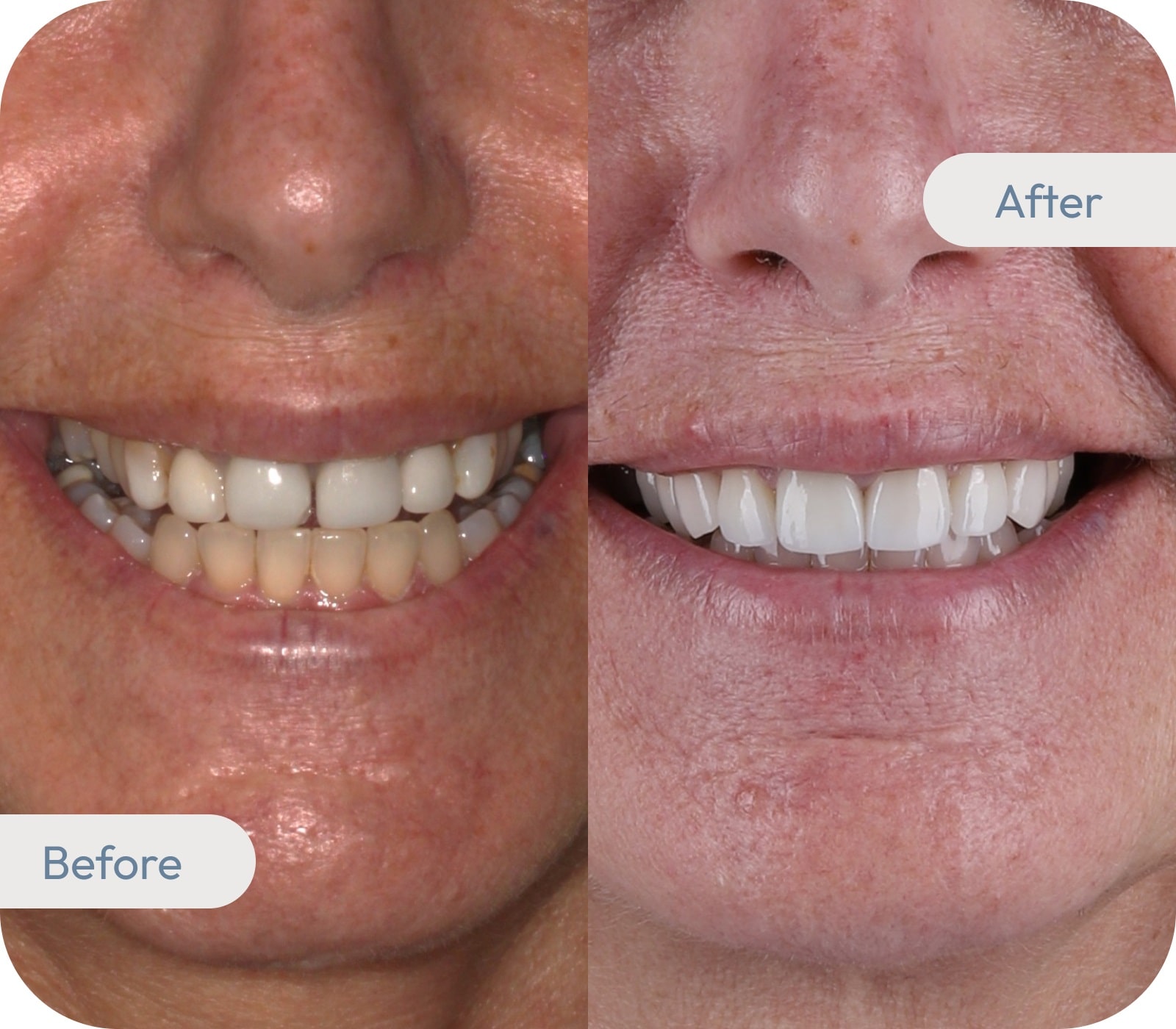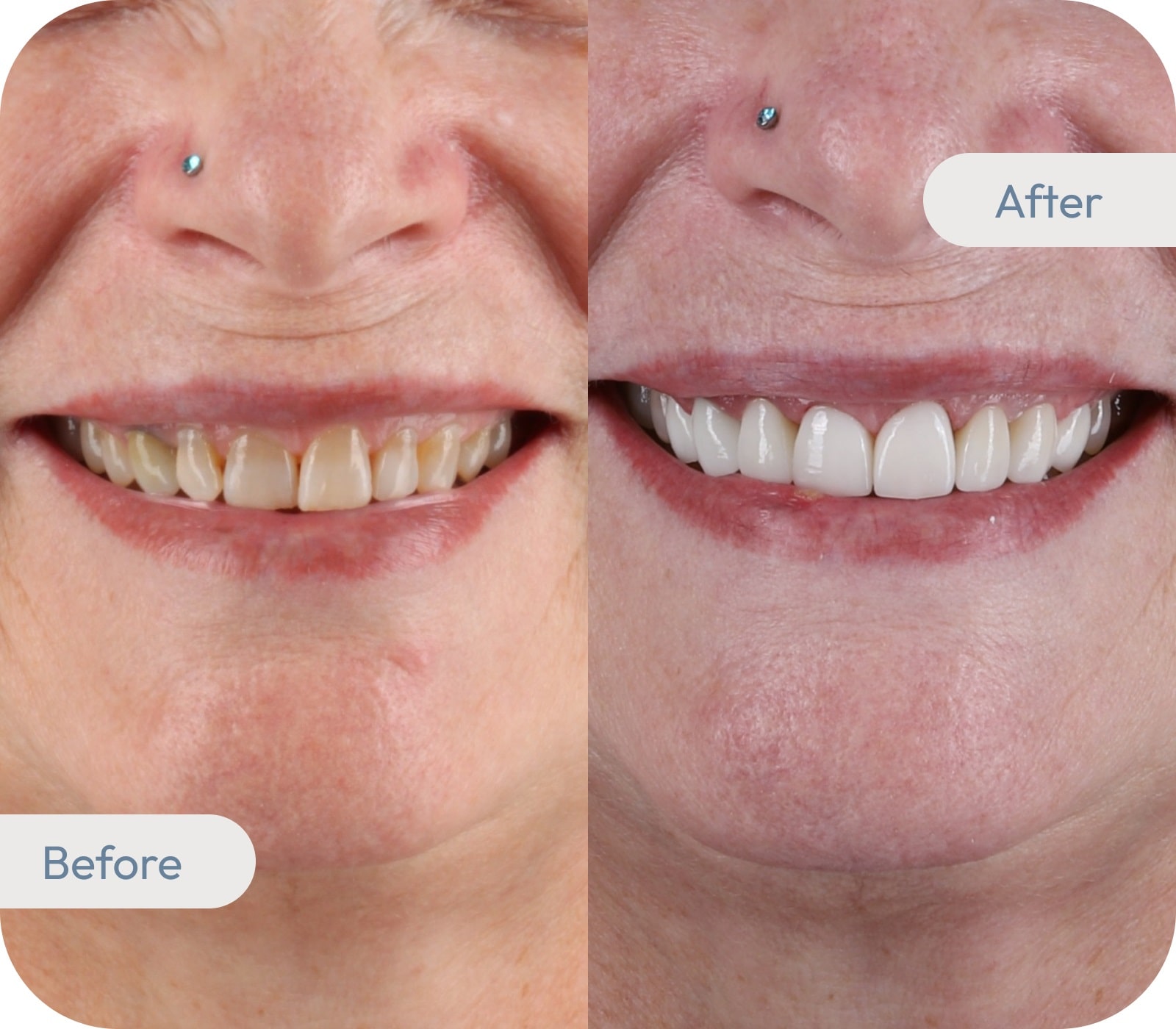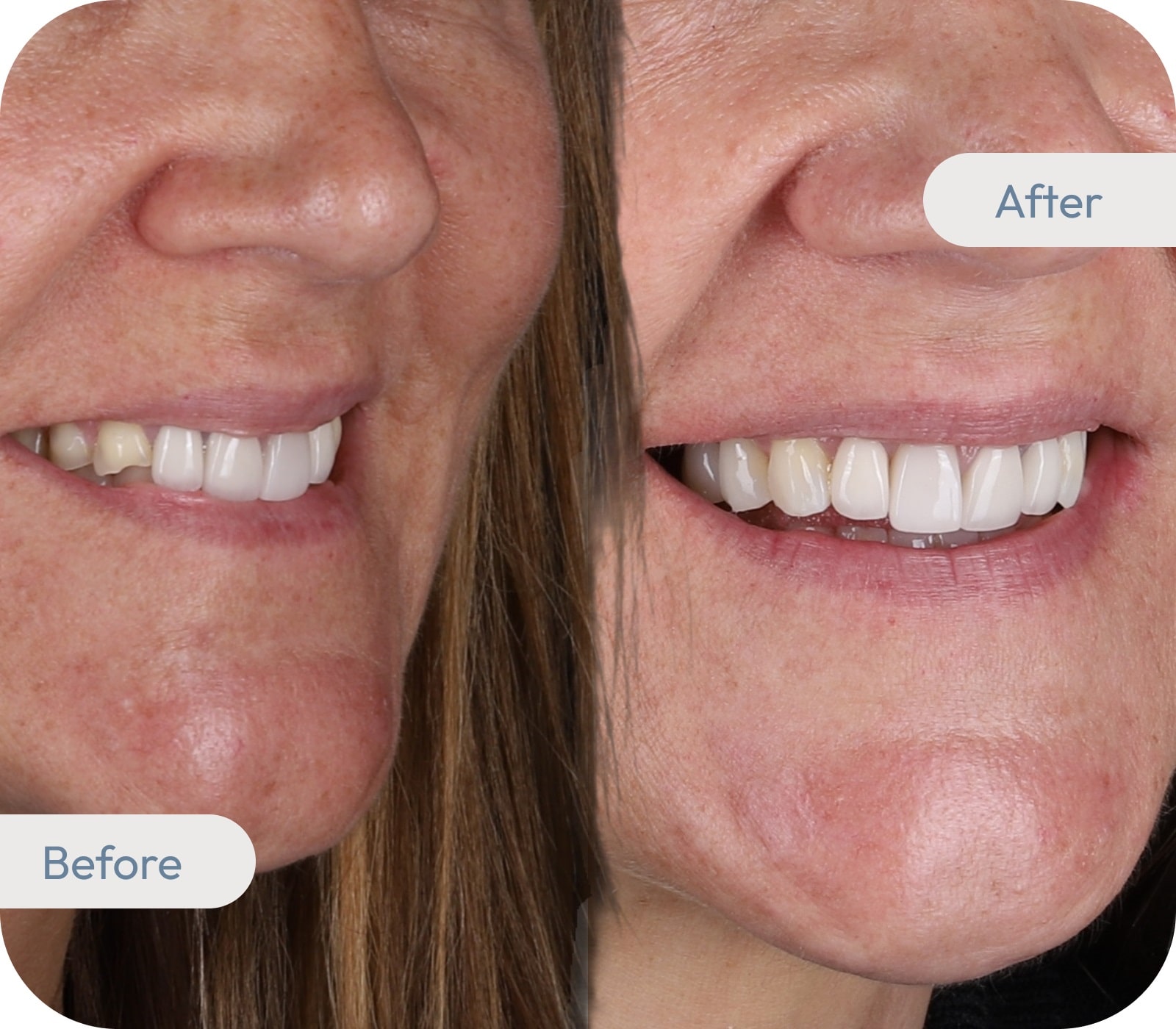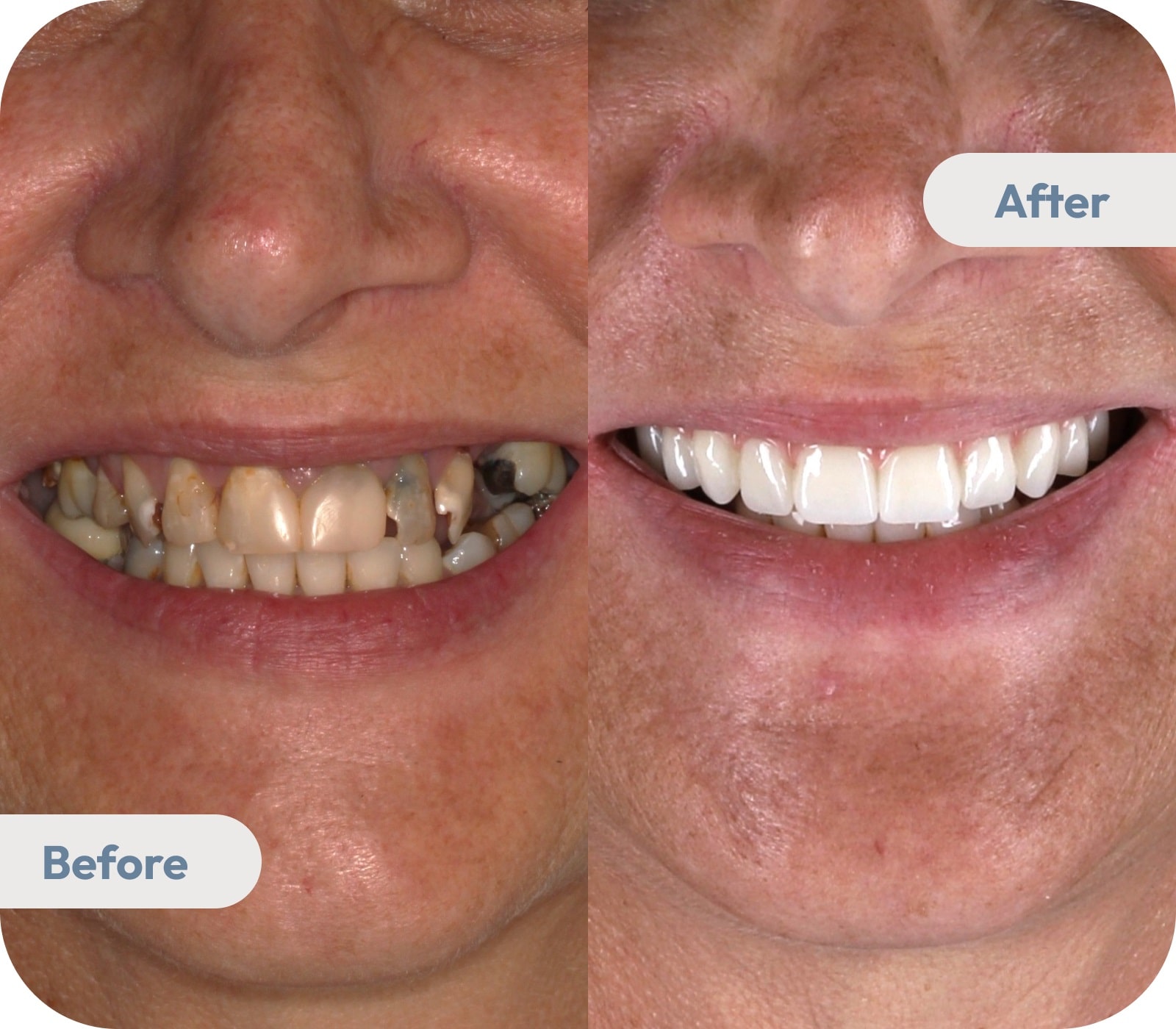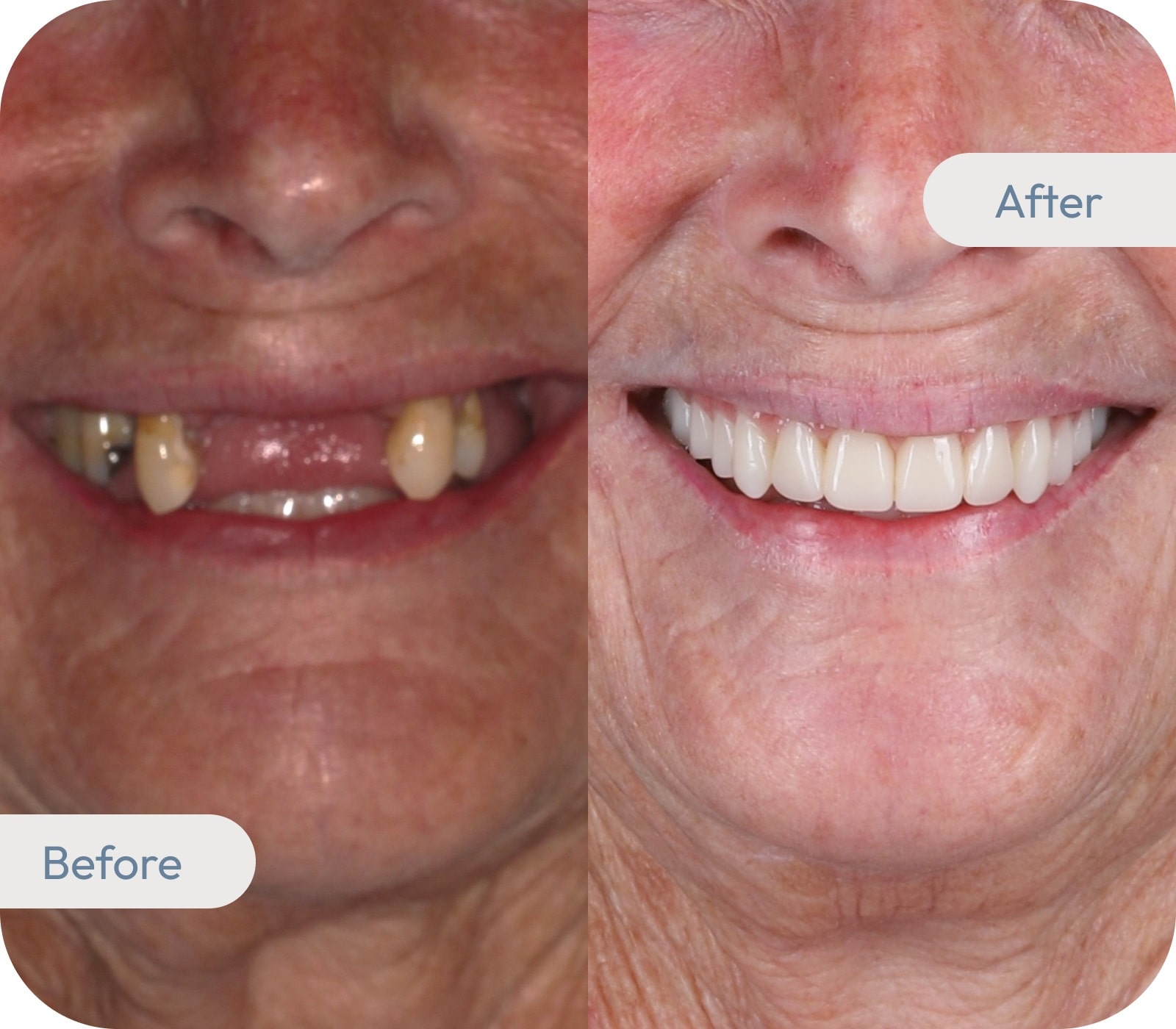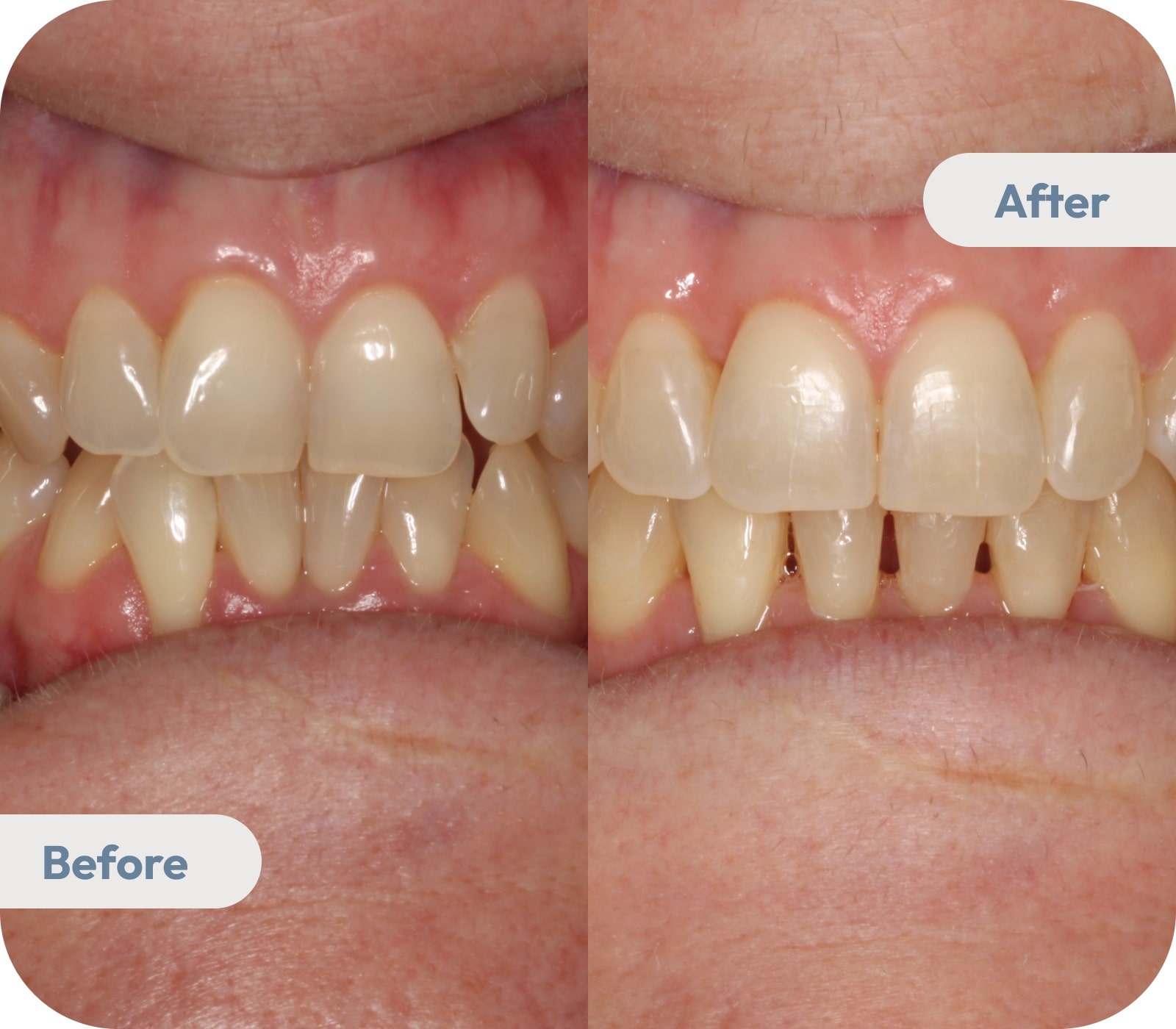Restore Function and Comfort to Your Smile
Restorative Dentistry in Bunbury for Healthy Teeth
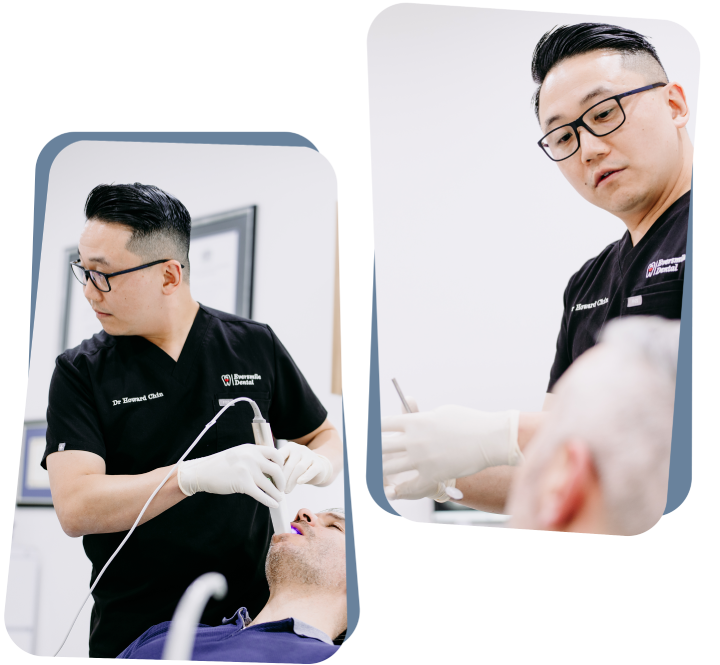
Helping You Chew, Smile, and Speak Clearly
Are You a Candidate for Restorative Dental Care?
- Missing teeth
If you’re missing one or more teeth, you may struggle with chewing and speech. Options like implants, bridges, or dentures can restore daily function and prevent nearby teeth from shifting out of place.
- Cracked or worn teeth
Cracks, chips, or heavy wear from grinding or trauma can weaken your teeth over time. Restorative options like crowns help rebuild strength, protect the tooth, and improve your ability to chew more comfortably.
- Tooth decay or cavities
If cavities are too large for simple fillings, your dentist may recommend inlays, onlays, or crowns. These restorative treatments rebuild the tooth’s structure and help prevent further decay, infection, or tooth loss.
- Failing dental work
Loose crowns, worn fillings, or old restorations that no longer fit properly may cause discomfort, plaque buildup, or decay. Replacing them helps preserve your oral health and maintain a strong, functional smile.
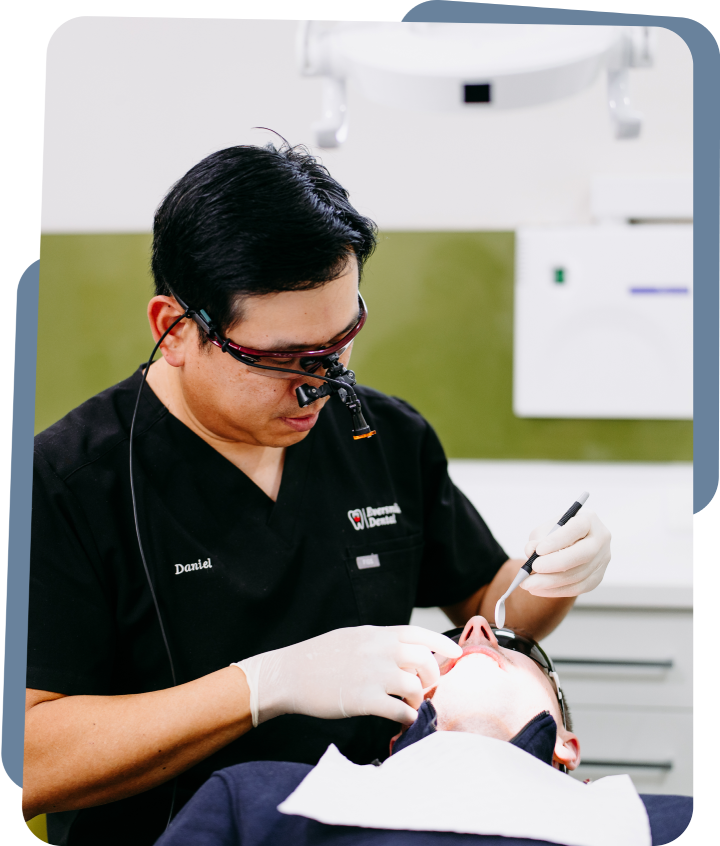

The Real-Life Benefits of Restorative Dental Treatments
- Improved chewing ability
Restorative treatments help rebuild teeth that are worn, broken, or missing. This makes it easier to chew a variety of foods. Better chewing supports digestion and brings more comfort to everyday meals.
- Better speech clarity
Your teeth affect how you speak. When teeth are replaced or restored, it becomes easier to pronounce words. You can speak more clearly and comfortably in daily life.
- Enhanced facial appearance
Missing or worn teeth can change the shape of your face. Restorative care helps support your cheeks and lips. It also fills visible gaps to improve the overall balance and function of your smile.
- Protection from further damage
Rebuilding weak or broken teeth supports your overall oral health. It helps prevent new issues such as infection, gum problems, or movement of nearby teeth. This protects your smile over time.
Your Restorative Dentistry Options at Eversmile Dental
Dental Crowns
Dental crowns cover and protect teeth that are cracked, worn, or weakened from decay or treatment. Each crown is designed to match the colour and shape of your teeth, where possible. They restore strength, shape, and function, helping you chew comfortably and prevent further damage to the remaining tooth structure.
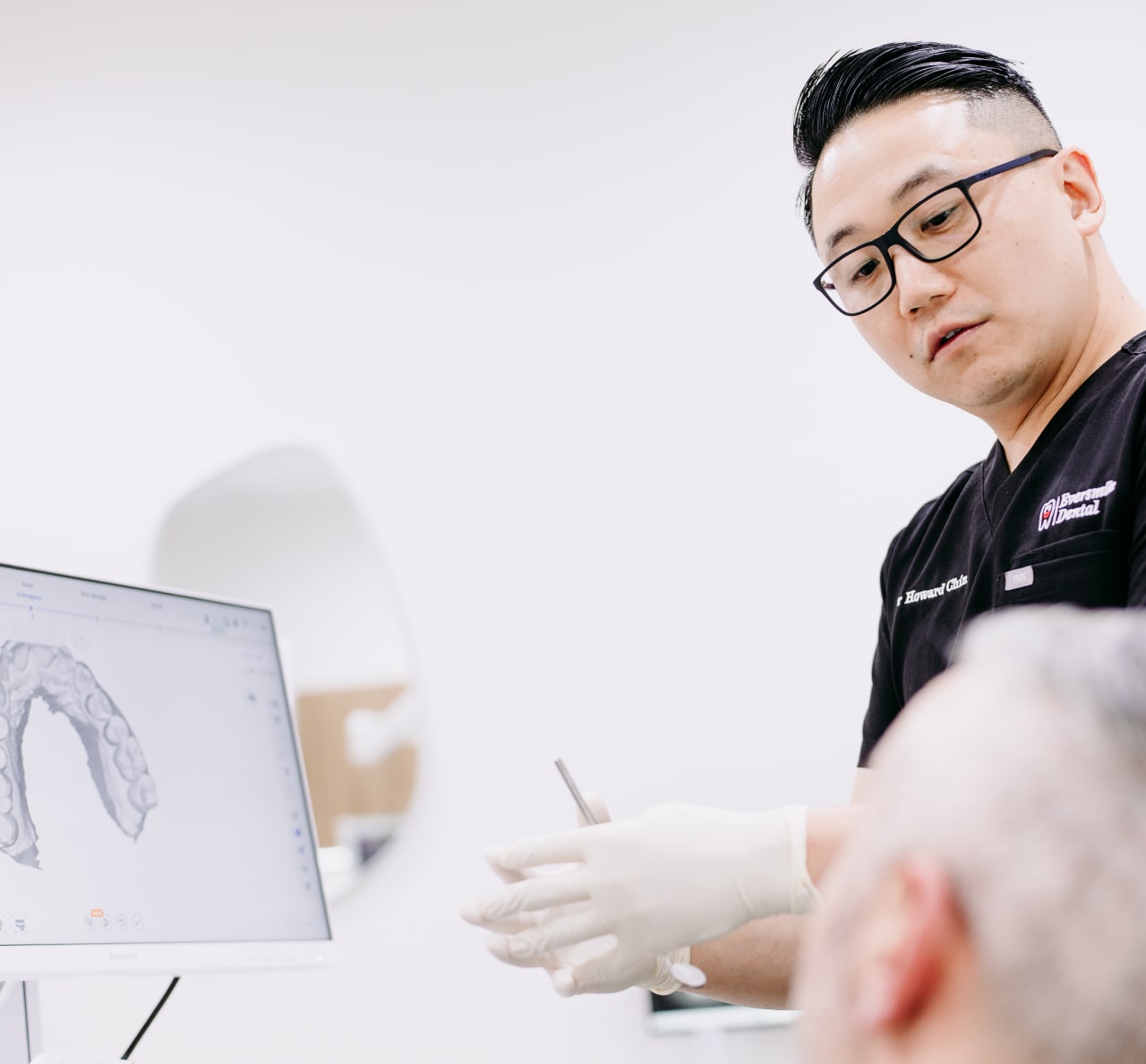
Dental Bridges
Dental bridges in Bunbury are used to replace one or more missing teeth in a row. Anchored to nearby natural teeth or implants, they restore your bite and help maintain alignment and oral function. Bridges also prevent neighbouring teeth from shifting out of place and help you speak and chew more easily.
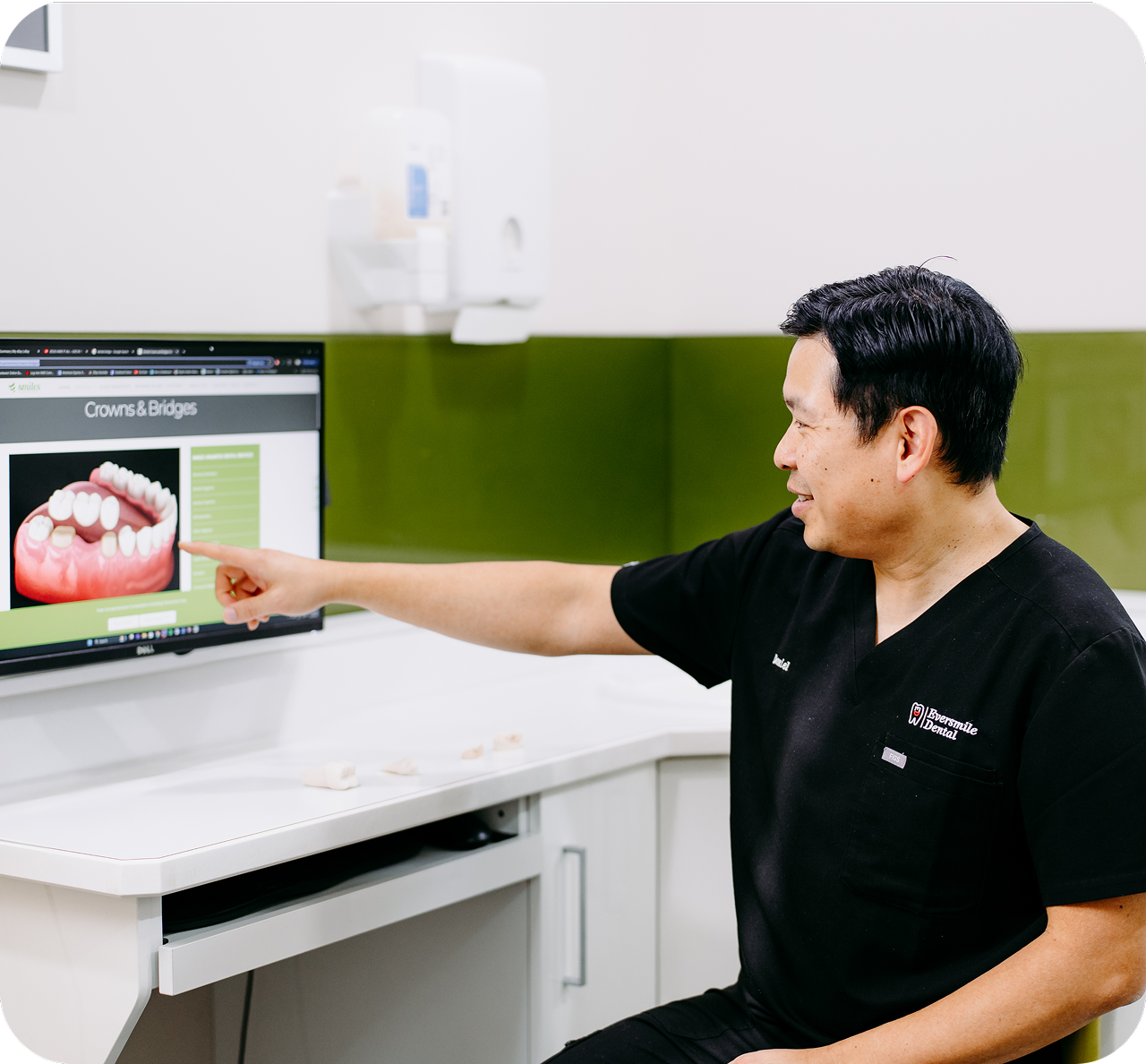
Dentures
Dentures are custom-made to replace several or all missing teeth in the upper or lower jaw. We offer full and partial options tailored to your needs. They fit the contours of your mouth, support jaw structure, and help maintain function, speech, and the ability to eat a wider range of foods.

Start with a Dental Consultation in Bunbury
Are you ready to prioritise your oral health? Book a consultation to discuss your oral health needs and treatment options.

What to Expect from Your Restorative Dentistry Appointment
You’ll be welcomed by our team in a professional, patient-focused environment from the moment you arrive. Your dentist will take time to understand your concerns, health history, treatment goals, and any worries you may have. We believe in listening first and providing clear communication. This approach creates a respectful experience that focuses on your needs and well-being during care.
A comprehensive oral exam will be performed to assess the condition of your teeth, gums, and bite. We use advanced digital tools, such as intraoral scanners and X-rays, to detect issues like decay, cracks, worn fillings, or failing restorations. These technologies help us make accurate assessments efficiently. You’ll be informed about what we find in a clear, easy-to-understand way. Visual aids will also be used to support your understanding.
After reviewing your scans and exam results, your dentist will explain the condition of your teeth and gums. We’ll walk you through suitable treatments, such as crowns, bridges, implants, or dentures, based on your goals and needs. Each option is explained clearly, including risks, benefits, timelines, and materials. This helps you make an informed decision that supports your oral health and lifestyle.
Every patient receives a customised treatment plan tailored to their oral health, lifestyle, and preferences. We’ll guide you through the recommended steps, timeframes, costs, and any additional care that may be required. You’re encouraged to ask questions, explore alternatives, and share concerns. Our focus is always on clarity, transparency, and patient-centred communication. This collaborative approach supports your oral health goals and places your preferences at the centre of each recommendation.
Before you leave, we’ll provide a clear written quote and an estimated treatment timeline. There’s no pressure to decide straight away. You’re welcome to ask questions, take time to consider your options or schedule when you’re ready. Our team supports you throughout the process with honest advice and practical guidance. We focus on respectful care that reflects your preferences and long-term oral health goals.
Smile Gallery – Before and After Treatment Examples
*These images display actual patients of our clinic. Every case is different, and treatment outcomes can vary according to individual conditions and needs.
Why Bunbury Turns to Us for Restoring Smiles
-
- Local Care, Genuine Connection
- We’re more than a dental team—we’re your neighbours, your kids’ schoolmates, and your fellow locals. Living and working in Bunbury means we understand the pace of life here and the needs of the people we serve. Our care is personal because this is our community, too, and your well-being matters to us.
-
- Providing Restorative Dental Care in Bunbury Since 2006
- For nearly two decades, our team has been providing restorative dental treatments for the Bunbury community. We offer crowns, bridges, and dentures, using established dental techniques and technology. The dentists at Eversmile Dental draw on their extensive experience to guide their approach to restorative care.
-
- Restorative Treatments for Different Age Groups
- Restorative dentistry can be applicable at different stages of life, depending on individual oral health needs. From restoring damaged teeth to replacing missing ones, our team offers a range of treatment options. We also emphasise prevention and long-term care to assist patients in managing their oral health over time.
-
- Restorative Care Designed Around You
- We recognise that every patient’s needs are unique. Our team takes the time to listen carefully, explain available treatment options, and answer your questions. Together, we develop a plan that reflects your oral health needs, personal preferences, and budget. Our goal is to help you make treatment decisions that are clear and well-informed.
-
- Professional Standards in Restorative Dentistry
- Our restorative care is based on current dental standards and supported by clinical evidence. We explain the purpose of each recommended option, allowing you to make informed choices about your treatment. Our focus is on delivering appropriate care in line with recognised professional guidelines.
-
- Incorporating Modern Technology into Patient Care
- Our clinic incorporates technology such as digital scans, CBCT imaging, and in-house 3D printing into patient care. We use these tools to assist in the planning and delivery of restorative treatments, including crowns, bridges, and implants. They are integrated into the way we provide restorative dentistry at Eversmile Dental.
Frequently Asked Questions
What's the difference between restorative and cosmetic dentistry?
Restorative dentistry focuses on rebuilding the strength and function of teeth that have been damaged, worn down, or lost. These treatments help improve chewing and oral stability.
The most common restorative procedures include the following:
- Fillings:
A filling is placed when a tooth has been affected by decay. The cavity is removed, the area is cleaned, and a strong material is shaped to restore its form. - Crowns:
A crown is a custom-made cover placed over a tooth. It provides strength and helps protect the remaining structure during everyday use. - Bridges:
A bridge is used to replace one or more missing teeth. It uses surrounding teeth for support and helps restore balance to your bite. Patients seeking dental bridges in Bunbury can discuss options tailored to their needs. - Dentures:
These are removable appliances that replace several or all missing teeth in the upper or lower jaw. They are designed to fit securely and support oral function. - Root canal therapy:
This procedure involves removing inflamed tissue from within a tooth. The space is sealed to help preserve the natural structure and maintain bite strength and function. - Dental implants:
Implants are used to replace missing teeth. A titanium post is placed into the jaw, followed by a crown that helps restore chewing and appearance. While implants are not exactly like natural teeth, some patients find them a durable and reliable option.
Cosmetic dentistry, by contrast, is focused on improving the appearance of your teeth and smile. These treatments are usually elective. Below are some common examples:
- Teeth whitening:
This brightens your natural teeth by reducing stains caused by food, drinks, or smoking. - Veneers:
Veneers are thin, tooth-coloured shells bonded to the front of teeth. They are used to change shapes, sizes, or colours. - Cosmetic bonding:
This involves applying a smooth, tooth-coloured material to enhance chipped or uneven areas. - Smile makeovers:
A combination of cosmetic options designed to refresh the overall look of your smile.
At Eversmile Dental, both cosmetic and restorative options are available. Restorative dentistry in Bunbury is often the first step when teeth are no longer functioning properly. Cosmetic care may follow once your oral health is stable.
Is tooth restoration painful?
Tooth restoration procedures are managed with local anaesthesia to reduce discomfort. Patients may notice pressure or movement during the procedure, although experiences vary depending on the tooth’s condition and the treatment involved.
After the procedure, it’s common to notice a few temporary symptoms. These may include:
- Mild soreness around the area that received care:
This can last for a day or two, especially if the tooth was sensitive beforehand. - Tenderness in the gums or jaw muscles:
This may occur if the mouth is open for a long time during the appointment. - Increased sensitivity to hot or cold:
Some people notice this after a restoration, but it usually settles within a short period.
These sensations generally pass within a few days. You can manage them with non-prescription pain relief. Eating soft foods and maintaining a gentle oral care routine may also help during this time.
What is the difference between a filling and a restoration?
The longevity of a dental restoration depends on the type of restoration, the materials used, and how well the mouth is cared for over time.
Crowns, bridges, and dentures all have different expected lifespans.
- Crown:
Depending on the material, a crown may last between 5 and 15 years. Ceramic and porcelain crowns fall within this range. With good oral hygiene and regular dental care, some may last longer. - Dental bridges:
A well-maintained bridge may last 10 years or more. The surrounding teeth and gums must stay healthy to support the bridge properly. - Dentures:
Most dentures need to be relined, adjusted or replaced every 5 to 8 years. This is due to natural changes in the shape of the gums and jaw over time.
All dental restorations will eventually wear down or need to be updated. Regular check-ups help identify issues early and prevent further problems.
How long do restorations last?
Dental crowns in Bunbury start from $1,660. Prices vary depending on individual needs. Book a consultation for a full quote.
Crowns, bridges, and dentures all have different expected lifespans.
- Crown:
Depending on the material, a crown may last between 5 and 15 years. Ceramic and porcelain crowns fall within this range. With good oral hygiene and regular dental care, some may last longer. - Dental bridges:
A well-maintained bridge can last over 10 years. The surrounding teeth and gums must stay healthy to support the bridge properly. - Dentures:
Most dentures need to be relined, adjusted or replaced every 5 to 8 years. This is due to natural changes in the shape of the gums and jaw over time.
All dental restorations will eventually wear down or need to be updated. Regular check-ups help identify issues early and prevent further problems.
How much does a crown cost?
Restorative dentistry may be beneficial for many people, particularly when it supports daily comfort, oral function, and long-term oral health.
- Material used:
Some materials are more durable or aesthetic, which may influence the price. - Condition of the tooth:
Teeth with significant loss may need extra support before placing a crown. - Number of visits:
Most crowns require two appointments, though some may need additional steps. - Additional procedures:
Imaging, temporary crowns, or foundation work may increase the total cost. - Payment options:
Flexible payment options are available, including on-the-day processing and SuperCare.
Final costs vary depending on the crown material, the condition of the tooth, and any additional procedures. A full quote will be provided after a clinical consultation.
Is restorative dentistry worth it?
Restorative dentistry can be worthwhile for many people, especially when it helps improve daily comfort, oral function, and long-term oral health.
If a tooth is worn down, broken, or missing, it may be harder to chew properly or speak clearly.
Gaps between teeth can also affect neighbouring teeth over time. Restoring the shape and strength of a tooth can make eating more comfortable and may help prevent further complications.
The value of restorative treatment depends on several personal factors, including:
- Your current oral health:
If a tooth is no longer supporting normal use, restoring it may help improve function and comfort. - Your goals and lifestyle:
Some people choose restorative care to improve eating, reduce sensitivity, or feel more at ease when speaking or smiling. - The type of restoration recommended:
Some options are designed to last for many years with proper care, which may make them a cost-effective choice over time. - The long-term outlook:
Leaving damaged teeth without attention may lead to more complex problems in the future, which can be more costly and harder to manage.
While restorative care is not always urgent, many patients choose it to maintain daily function and avoid discomfort.
Your dentist can help you understand the pros and limitations of each option based on your individual needs.
What materials are used in restorative dentistry?
Restorative dentistry uses a range of materials depending on the type of procedure, the location of the tooth, and your personal preferences. Each material has different strengths, appearances, and costs.
Common materials include the following:
- Composite resin:
This tooth-coloured material is often used for fillings. It blends with natural teeth and is suitable for front and back teeth. - Porcelain:
Porcelain is used in crowns, veneers, and bridges. It has a natural appearance and is often chosen for visible teeth. - Zirconia:
Similar to porcelain, zirconia is a durable material that is mostly used for posterior teeth. It is metal-free and can be suitable for people with certain sensitivities. - Metal alloys:
These include gold or other durable metals used in crowns or bridges, especially on back teeth, where extra strength is needed. - Porcelain-fused-to-metal:
This material combines the strength of metal with the appearance of porcelain. It is commonly used for crowns and bridges. - Acrylic:
Acrylic is used in dentures. It can be coloured to match gum tissue and is often combined with metal for added stability.
At Eversmile Dental, we offer a variety of options for tooth restorations in Bunbury. The choice of material depends on clinical needs, the tooth’s location, and patient preferences. Your dentist will recommend the most suitable option during your consultation.
Are dental implants restorative?
Yes, dental implants are a type of restorative dentistry. They are used to replace missing teeth and support oral function.
A dental implant has two parts:
- The titanium post:
This part is placed into the jawbone. It acts like a replacement for the natural tooth root. - The restoration:
This may be a crown, bridge, or denture attached on top of the post, depending on how many teeth are missing.
Implants may provide a longer-term option to replace missing teeth in Bunbury. They can support everyday activities like chewing and speaking, and in some cases may help maintain bone structure after tooth loss. Suitability for implants depends on individual oral health and a professional assessment.
What is a full dental restoration?
A full dental restoration refers to the process of rebuilding or replacing several teeth across the upper or lower jaw, or sometimes both. It is often recommended when multiple teeth have been worn down, damaged, or lost.
This type of restoration aims to support function, appearance, and comfort. It may include a combination of procedures, depending on your individual needs.
Common elements of a full dental restoration may include:
- Crowns:
These are used to restore teeth that have lost significant structure. - Bridges:
These replace one or more missing teeth by using nearby teeth for support. - Dentures:
Full or partial dentures may be used when several teeth are missing. - Dental implants:
Implants can be placed to support crowns, bridges, or dentures. This may be considered for added stability, depending on suitability.
Each plan is based on your specific situation, including the condition of your teeth, gums, and bite. A complete assessment is required before recommending any long-term approach.
Can teeth be restored naturally?
Teeth cannot fully restore themselves once they have lost structure due to decay, cracks, or injury. Enamel, the outer layer of the tooth, does not regenerate. This means that once part of a tooth is worn away or damaged, it will not grow back.
However, in the very early stages of enamel weakening, it may be possible to slow or stabilise further breakdown. This process, called remineralisation, supports enamel strength but does not replace lost tooth structure.
Here are some ways to support the strength of natural enamel:
- Using fluoride toothpaste daily:
Fluoride helps reinforce enamel and can slow the early signs of weakening. - Maintaining a low-sugar diet:
Reducing sugary snacks and drinks helps limit acid attacks on the teeth. - Drinking plenty of water:
This helps rinse the mouth and support saliva production, which protects the teeth. - Keeping up with regular dental visits:
Early signs of enamel loss can be monitored and managed before they develop into larger problems.
Once a tooth has developed a cavity or structural damage, professional dental care is required. In these cases, restorations such as fillings, crowns, or other options are needed to rebuild strength and function.
Various Payment Options Available
Book Your Appointment Online or Call Our Bunbury Dental Clinic
Book an appointment with our dentist in Bunbury to discuss your oral health needs. We provide tailored dental treatments and clear information to support informed decisions about your dental care.
